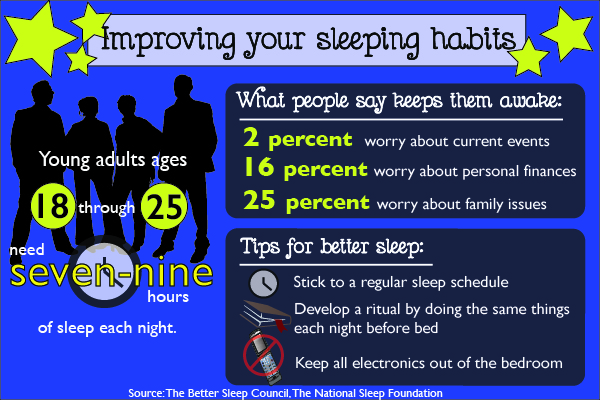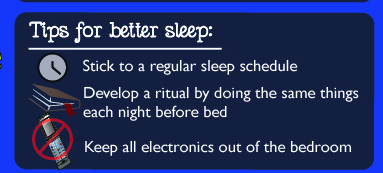
The Wellness Center is currently hosting a sleep challenge called “Get More Zzz’s to Get More A’s” this month to improve students’ sleep habits.
Wellness Center Peer Educator Claire Decelles said the goal of the challenge is to “change the language around sleep” because many college students don’t realize how important sleep is.
“I think a lot of people have an attitude where it’s like, ‘Guess what? I only slept four hours last night,’ and that’s the cool thing to do, and they brag about that to their friends,” Decelles said. “So we want to change it to, ‘Guys, I got the best sleep of my life last night.’”
About 50 student participants will record the quality and length of their sleep for 21 days using an app called Sleepbot, which tracks a user’s movement during the night. Participants who track their sleep for all 21 nights, or those who get eight hours of sleep for at least 15 nights, will be eligible to win prizes.
“During different sleep cycles, you move differently in your sleep,” Decelles said.
Senior Madelyn Larsin is one of the participants and said she joined the program because she wanted to hold herself accountable for getting more sleep.
“Even though there are nights when I don’t get exactly eight hours, I think that being more mindful about my sleep habits will really help me in the long run,” Larsin said. “I feel like I am creating a good habit that I hope sticks even when the challenge is over.”
Psychology professor Roxanne Prichard, who has experience with sleep research involving students, said college students do not have the best sleeping habits.
“Students tend to have really shortened sleep on the weekdays, with sometimes longer naps at irregular times, and then sleep that’s later in the day on the weekends,” Prichard said. “Then (students) try to do make-up sleep, which you can’t really do.”
A sleep debt, according to Prichard, is the hours of sleep a person would have gotten if allowed to wake naturally.
“You can only make up about 40 percent of the sleep that you lost on any given day,” Prichard said. “That lost sleep cannot really be made up on weekends, and it’s actually pretty bad for your circadian rhythm to have what’s called the midpoint of sleep be so different from day-to-day and from weekday to weekend.”
Prichard said poor sleep habits affect every system of one’s body, especially the brain.
“A lot of people might think that students with the highest grades get the least sleep because they’re studying all the time, but that’s not true. The students with the highest grades tend to get the most sleep and the best quality sleep,” Prichard said.
Though the sleep challenge offers prize incentives, Prichard suggested students see for themselves how better sleep can really improve their lives.
“One tip I would give is to just try sleeping well and see how much better you feel,” Prichard said. “Usually once they try it, people don’t want to go back to a less regular rhythm.”
Lauren Schaffran can be reached at scha7492@stthomas.edu.



